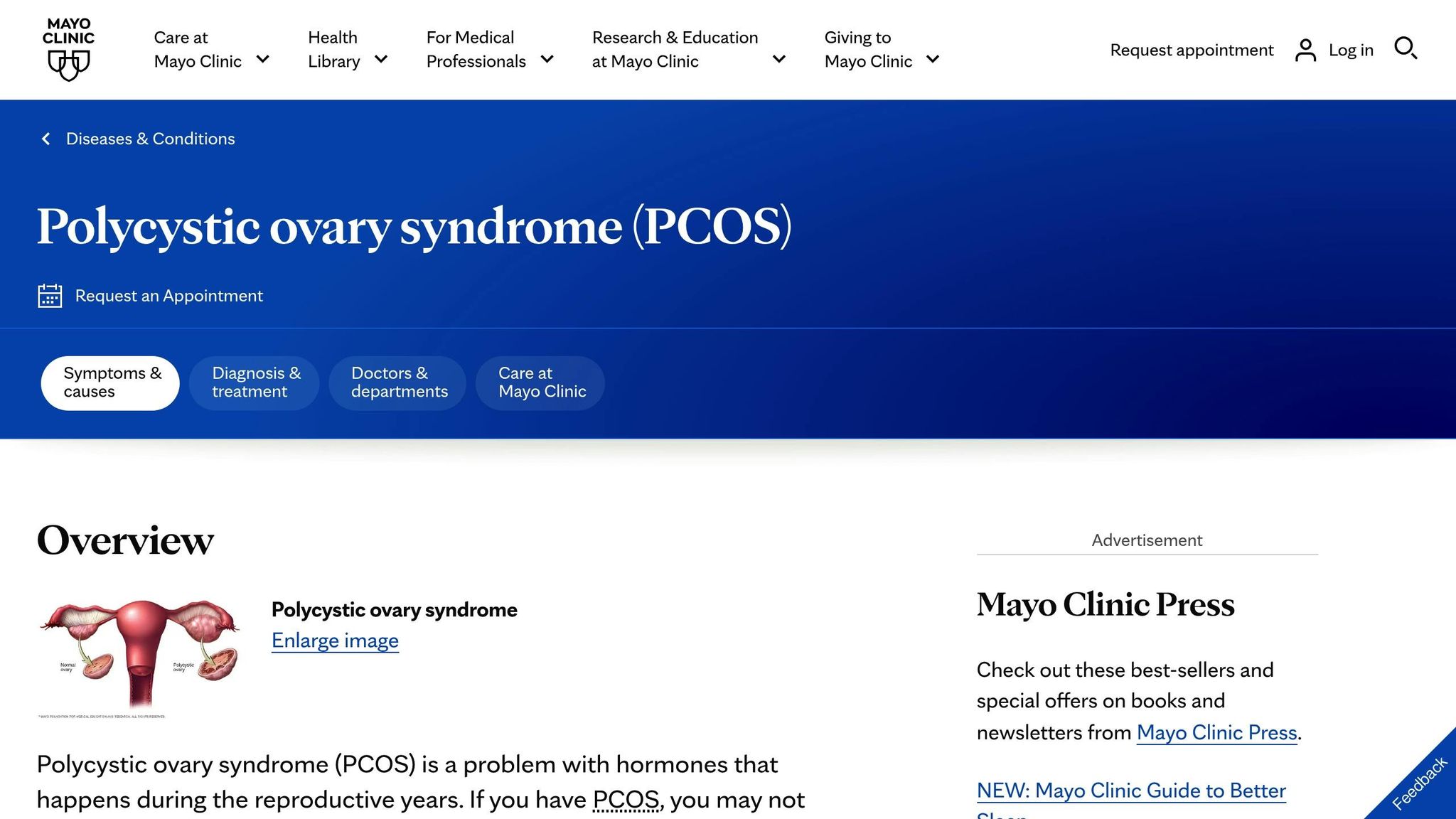How Diet Impacts Sleep in PCOS

Did you know that your diet can directly affect your sleep if you have PCOS? Poor sleep and PCOS often create a cycle where hormonal imbalances, insulin resistance, and inflammation make restful sleep harder to achieve. But the good news is that small dietary changes can help break this cycle and improve both sleep and PCOS symptoms.
Here’s what you need to know:
- Key nutrients like magnesium, melatonin, and omega-3s can promote better sleep and hormone balance.
- Avoiding blood sugar spikes by limiting sugary foods and eating balanced meals can lead to more restful nights.
- Meal timing matters - eating dinner 3–4 hours before bed and choosing light, sleep-friendly snacks can improve sleep quality.
For example, a dinner of baked salmon, quinoa, and roasted broccoli with olive oil can stabilize blood sugar and provide sleep-supporting nutrients. By making these adjustments, you can enhance your sleep and make managing PCOS easier.
Keep reading to learn specific food recommendations, meal ideas, and habits to support better sleep!
The Link Between Poor Sleep and PCOS

Sleep Problems in PCOS
Sleep issues linked to PCOS can significantly affect overall health. Addressing these disruptions often involves dietary strategies that help maintain hormonal balance.
Hormone Changes and Sleep Cycles
Hormonal imbalances in PCOS can interfere with natural sleep-wake cycles. Elevated androgen levels may delay falling asleep, lead to frequent waking during the night, and create irregular sleep patterns. These disruptions can further aggravate hormonal imbalances.
Insulin Resistance and Sleep Quality
Insulin resistance, a common feature of PCOS, is closely tied to poor sleep. Lack of quality sleep can worsen insulin resistance, while insulin resistance itself often leads to restless nights. Blood sugar fluctuations may cause nighttime awakenings, increase the risk of sleep apnea, and prevent deep, restorative sleep. Managing blood sugar levels through diet is essential to breaking this cycle. Studies show that PCOS affects up to 10% of women of reproductive age [1].
Inflammation Effects on Sleep
Chronic inflammation, frequently seen in PCOS, can disturb sleep and lead to daytime fatigue. This happens because inflammation interferes with the body’s ability to regulate sleep. Incorporating anti-inflammatory foods and maintaining stable blood sugar levels can improve sleep quality and help manage PCOS symptoms. These dietary adjustments are key to tackling inflammation and enhancing overall well-being.
Sleep-Supporting Nutrients for PCOS
Certain nutrients can improve sleep quality while helping manage PCOS symptoms. Since hormonal and inflammatory changes often disrupt sleep, incorporating these nutrients into your diet can make a difference.
Magnesium for Relaxation and Sleep
Magnesium plays a key role in calming the nervous system and relaxing muscles, which is especially helpful for women with PCOS. It also supports hormone balance. Here are some magnesium-rich foods to consider:
| Food Source | Magnesium Content (per 1 cup serving) |
|---|---|
| Spinach (cooked) | 157 mg |
| Swiss chard | 150 mg |
| Pumpkin seeds | 168 mg |
| Black beans | 120 mg |
| Almonds (per oz) | 80 mg |
Adding these to your dinner or as an evening snack can promote better sleep.
Natural Melatonin Boosters
Certain proteins can help increase natural melatonin levels, aiding restful sleep. Here are some excellent options:
| Protein Source | Benefit |
|---|---|
| Turkey breast | High in tryptophan |
| Wild-caught salmon | Contains tryptophan |
| Greek yogurt | Packed with protein and calcium |
| Pumpkin seeds | Rich in tryptophan and magnesium |
| Eggs | Complete protein with sleep aids |
Pair these proteins with complex carbohydrates at dinner for better tryptophan absorption, which helps with melatonin production.
Omega-3s for Sleep and Inflammation
Omega-3 fatty acids are known to reduce inflammation and improve sleep patterns. Include these sources in your diet:
- Cold-water fatty fish like salmon, mackerel, and sardines (aim for 2–3 servings per week).
- Plant-based options such as chia seeds, flaxseeds, and walnuts.
- Algae-based alternatives for vegetarians or vegans.
Incorporating these foods regularly can support both sleep and overall health.
Foods and Habits That Harm Sleep
Eating well can support better sleep, but certain foods - especially those high in carbs and sugar - can cause blood sugar swings that interrupt sleep, particularly for those with PCOS.
Blood Sugar Spikes at Night
Foods like white bread, pastries, cookies, sodas, and fruit juices can cause quick blood sugar spikes, followed by sharp drops. These fluctuations can throw off your sleep cycles. To avoid this, aim for balanced, nutrient-rich meals and snacks in the evening to help maintain steady blood sugar levels. Up next, we'll look at how caffeine and alcohol can also interfere with sleep in PCOS.
Diet Changes for Better Sleep
Making smart choices about what and when you eat can help improve sleep for those with PCOS.
Blood Sugar-Friendly Meals
Keeping blood sugar steady through the night is key. Aim for meals that include:
- Lean proteins (4–6 oz): chicken breast, fish, tofu, or legumes
- Healthy fats (1–2 tbsp): avocado, olive oil, or nuts
- Complex carbs (½–1 cup): quinoa, sweet potatoes, or brown rice
- Non-starchy vegetables: fill half your plate
Example dinner: 5 oz of baked salmon, 1 cup of roasted broccoli, and ⅔ cup of quinoa drizzled with 1 tablespoon of olive oil.
Best Meal Times for Sleep
When you eat matters just as much as what you eat. Follow these guidelines:
- Have dinner 3–4 hours before going to bed.
- Finish any snacks at least 2 hours before bedtime.
- Keep dinner portions moderate to avoid discomfort.
For instance, if you plan to sleep at 10:30 PM, aim to eat dinner between 6:30–7:30 PM. This gives your body time to digest comfortably.
Evening Snack Options
If you need a snack before bed, choose options that promote sleep without spiking blood sugar. Here are a few ideas:
| Snack | Portion | Benefits |
|---|---|---|
| Greek yogurt with berries | ¾ cup yogurt + ¼ cup berries | High in protein and natural melatonin |
| Pistachios | 1 oz (about 28 nuts) | Provides protein and magnesium |
| String cheese with apple | 1 cheese stick + ½ small apple | Balanced protein and fiber |
| Hard-boiled egg with cucumber | 1 egg + ½ cup cucumber | Low-carb and protein-packed |
These snacks are simple, satisfying, and help set the stage for a restful night.
Conclusion
Dietary changes can play a key role in improving sleep for those with PCOS by addressing hormone balance, insulin levels, and inflammation. Here’s how you can make practical adjustments:
- Combine proteins, healthy fats, and complex carbs to stabilize blood sugar.
- Incorporate nutrients like magnesium, melatonin, and omega-3s that promote better sleep.
- Align your meal timing with your body’s natural sleep cycles.
- Prioritize nutrient-dense foods that provide multiple health benefits.
For example, foods like fatty fish and dark leafy greens are excellent sources of omega-3s and magnesium, which can enhance sleep quality. Pairing this with thoughtful meal timing - such as avoiding heavy meals before bed and opting for a light, sleep-friendly snack - can make a big difference.
FAQs
How do nutrients like magnesium and omega-3s support better sleep for women with PCOS?
Certain nutrients, such as magnesium and omega-3 fatty acids, can play a key role in improving sleep quality for women with PCOS. Magnesium helps regulate stress hormones and supports relaxation, which may make it easier to fall and stay asleep. Omega-3s, found in foods like fatty fish and walnuts, can reduce inflammation and promote hormone balance, both of which are linked to better rest.
Incorporating magnesium-rich foods like spinach, almonds, and avocados, or adding omega-3 sources such as salmon, chia seeds, and flaxseeds to your diet, can be a simple yet effective way to enhance sleep. Always consult with your healthcare provider before making significant dietary changes to ensure they align with your specific needs.
What are some easy meal and snack ideas to balance blood sugar and improve sleep for women with PCOS?
Maintaining stable blood sugar levels can significantly improve sleep quality for women with PCOS. Incorporating balanced meals and snacks that combine protein, healthy fats, and fiber can help regulate blood sugar and support restful sleep.
Here are some practical ideas:
- Meals: Grilled chicken or salmon with roasted vegetables and quinoa, or a hearty salad with leafy greens, avocado, boiled eggs, and a drizzle of olive oil.
- Snacks: A handful of almonds or walnuts, Greek yogurt with a sprinkle of chia seeds, or apple slices paired with almond butter.
Avoid large meals or sugary snacks close to bedtime, as they can disrupt your sleep. Focus on whole, nutrient-dense foods to support both your blood sugar and overall health.
How does meal timing affect sleep quality in women with PCOS, and what are some helpful guidelines?
Meal timing plays a significant role in sleep quality for women with PCOS due to its impact on blood sugar levels, hormone regulation, and overall metabolism. Irregular eating patterns or late-night meals can disrupt your body's natural rhythm, making it harder to fall asleep or stay asleep.
To support better sleep:
- Avoid heavy meals close to bedtime, as they can cause discomfort and interfere with restful sleep.
- Maintain consistent meal times throughout the day to help regulate blood sugar and support hormonal balance.
- Include foods rich in magnesium and tryptophan, such as leafy greens, nuts, seeds, and lean proteins, which may promote relaxation and improve sleep quality.
By aligning your eating habits with your body's needs, you can enhance both your sleep and overall well-being with PCOS.
